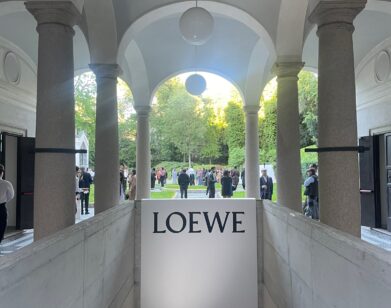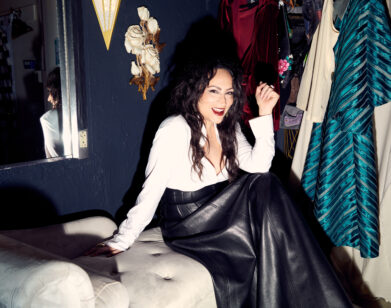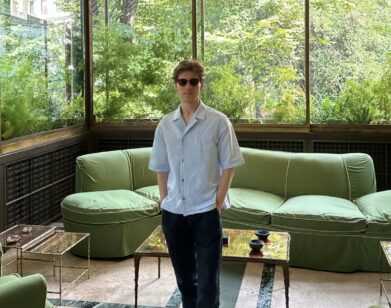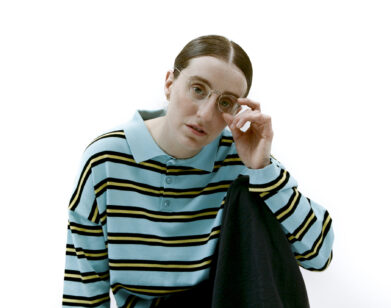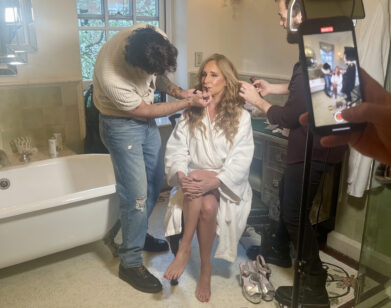Paul Reubens
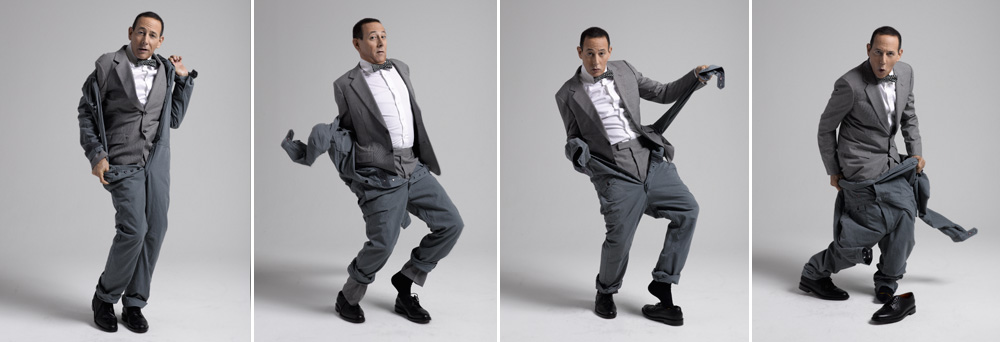
If you grew up in the 1980s, some part of your brain has been permanently altered by the phenomenon of Pee-wee Herman. For most kids, images of the adult-size, vaguely ADD-addled eternal child in a tight gray suit and a red miniature bow tie (more than two decades pre-Thom Browne) stem from the blockbuster bike picaresque Pee-wee’s Big Adventure (1985) or the long-running live-action Saturday morning show Pee-wee’s Playhouse (1986–1991). But those two mainstream iterations weren’t actor Paul Reubens’s first runs with the loud and lovable Pee-wee. He initially improvised and polished the character in the late 1970s at the Groundlings Theatre in L.A. and built Pee-wee into a cultish live-stage comedy show in the early ’80s. While hardly X-rated, these early renditions weren’t particularly prime for an audience of nine-year-olds scarfing down Frosted Flakes on Saturday mornings. And perhaps the very fact that Pee-wee appealed to adults as well as children—that he actually arrived in a playhouse via a nightclub—is what made the character so compelling, if slightly off-kilter. Today, Reubens compares what he was doing to performance art. He gave up his entire public persona to the Pee, even doing interviews and award shows as his alter ego.
The 1990s lost track of Pee-wee following Reubens’s much-publicized arrest in 1991 for indecent exposure at a Sarasota, Florida, movie theater. Reubens set the character aside and went on to appear in films such as Mystery Men (1999), and Blow (2001), and on TV shows such as 30 Rock and Pushing Daisies. (He will also be seen in Todd Solondz’s upcoming sequel to Happiness, Life During Wartime.) This November, though, Reubens, 57, is reviving his long-lost comic juggernaut (and of course some of the characters that filled his playhouse too) when he opens an entirely new Pee-wee Herman Show live onstage in Hollywood. He’s also finished a new Pee-wee film script. Paul Rudd, a longtime Pee-wee fan and fellow lifetime member of the “P.R. initials” Hollywood inner circle, sizes up the man in the undersize suit.
PAUL RUDD: Paul and Paul. P.R. and P.R.
PAUL REUBENS: That’s right. I’m glad you mentioned that. I want to make sure everybody realized we had the same initials.
RUDD: [laughs] Now we just need to get Pamela Reed on the phone.
REUBENS: [gasps] Good idea. I love Pam Reed. Did you ever work with her?
RUDD: No. She’s the first other P.R. that I thought of. Pat Robertson—not as good. [Reubens gasps] Paul Rodriguez. Paul Rudnick.
REUBENS: Wow. This is sort of cheapening the whole idea of you and me being the only two cool guys in show business with P.R.
RUDD: Let me ask you something. Do you think if somehow either you or I contacted Paul Rudnickor Paul Rodriguez, we could all go somewhere on vacation?
REUBENS: Well, I used to know Paul Rodriguez a long time ago when we were both coming up in show business, so I think it’s possible. I wouldn’t mind combining that idea with doing something I’ve never done before, like going on a cruise. But that could be a mistake because you’re trapped on board. What if you, me, and Paul Rodriguez all of a sudden had a problem with Paul Rudnick?
RUDD: Which undoubtedly we would. But Paul could also go down to the casino or play shuffleboard.
REUBENS: Or accidents happen at sea all the time. It’s so weird that there is Paul Rudd and Paul Rudnick. I never thought of that before.
RUDD: I’m the one who wrote Jeffrey [1995].
REUBENS: The only thing I have like that is RuPaul.
Photo credit: Paul Reubens in Los Angeles, August 2009. Suit and Shirt: Thom Browne.
I almost felt like Pee-wee Herman was conceptual art because I went to great lengths to make people think that he was a real person. It’s interesting to redo the character now because I really haven’t been Pee-wee Herman for a long time and people know now that there’s an actor behind him.”Paul Reubens
RUDD: Well, I’m very excited to be talking to you. We know each other but not really very well. And I’ve always been a big fan of yours. Now, I see that you are going to do a live show again. I never got to see Pee-wee live. I remember the comedy special you did on HBO.
REUBENS: The special preceded The Pee-wee Herman Show. The special was a young comedians show, which is probably the first time Pee-wee really appeared on television. Well, before that, actually, I was on The Dating Game three times as Pee-wee. That was a little test experiment I was doing early on. I went to a cattle call audition for The Dating Game, and before I even got home they called me back.
RUDD: That sounds like a very Andy Kaufman–esque thing to do. It’s almost performance art. Did you let them know about Paul Reubens?
REUBENS: No, I just went in in my full Pee-wee thing and filled out the application as Pee-wee Herman. They asked, “What are your hobbies?” and I listed all Pee-wee Herman stuff. You know, Andy Kaufman was working at the same time and Iwas very influenced by him. I liked his work, and I knew him a teeny, tiny bit. I certainly wouldn’t consider myself a friend of his, although I would have liked to have been. I always sort of felt like Pee-wee Herman was performance art a little bit, and what I personally liked about it was that I was the only person who knew that. I was in art school at CalArts [California Institute of the Arts] just prior to joining The Groundlings and developing Pee-wee Herman. I almost felt like Pee-wee Herman was conceptual art because I went to great lengths to make people think that he was a real person. It’s interesting to redo the character now because I really haven’t been Pee-wee Herman for a long time and people know now that there’s an actor behind him. I’ve done other movies and parts. I’m interested to see whether that aspect will have an effect on it, but I don’t have any control over that. So it will or it won’t.
RUDD: I remember seeing a picture a long time ago of you at CalArts. You had a goatee, and I thought, Okay, so there really is a person there. And then I saw you in a Cheech and Chong movie, where you are under a table . . .
REUBENS: I was Pee-wee Herman in one Cheech and Chong movie [Cheech and Chong’s Next Movie, 1980], but in the one you’re talking about, Nice Dreams [1981], I was a character who gets referred to as [Howie] the Hamburger Dude. Boy, that movie was incredible to work on because we were all playing inmates in a mental institution: Sandra Bernhard was one, and Sally Marr, who was Lenny Bruce’s mom, was another. And the head doctor was Timothy Leary, who had just gotten out of jail. The whole cast was great at improvisation—Cheech and Chong hired all of us from The Groundlings because there never was an actual script.
RUDD: I remember hearing you go, “Hamburger.”
REUBENS: Ironically, I was writing the stage version of The Pee-wee Herman Show while I was on the set of that film. And I’m working with a lot of the same people again today.
RUDD: The earliest incarnation of Pee-wee was definitely a strange kind of performance art, which to me always felt intended for grown-up audiences. Was it odd to retain the unique quality of the character but gear it for a kids’ show on TV?
REUBENS: Honestly, most questions that are asked of me about Pee-wee Herman I don’t have a clue on. I’ve always been very careful not to dissect it too much for myself. I love when other people do, but it takes some of the fun out of the work when I have to start figuring out how Pee-wee Herman ticks. But to answer your question, I never viewed the adult “version” of the show, which was done at midnight and was an homage to ’50s children’s television shows, as solely for adults. I tried to make it so that the act carried over into the version that wound up on CBS on Saturday mornings. And if a kid had seen the original version and caught something in the Saturday morning version, he might be able to laugh at something dirty because he caught the reference. And if a kid didn’t know, it flew right over his head. I always designed things to be double entendres so it could be appreciated either way. I never really viewed it as, “Oh, this is the adult version, and this is the kid’s version.” In fact, when we were doing the adult version, I tried to make it for kids. And as soon as I had a real kids’ show, I tried to add enough stuff to make adults remain interested in it. I think the show we are working on for this fall is much more geared for adults. And even though kids could probably come to see it, I’m kind of discouraging people from bringing their kids because it just seems like a little too much responsibility.
RUDD: How long have you been working on the new production?
REUBENS: I had been talking to my producer every month for two years. He would call me up and say, “What about now?” and I’d say, “I don’t feel like doing it anymore.” Then he’d call me the next month, and I’d say, “I’m really excited. I can’t wait to do it.” For two years, he was really patient, and then about six months ago I fully committed, and I’ve been rewriting the material for about six weeks. I’ve just hired a director and a designer, and I have a huge list of some of the original people I worked with on the original stage show. Phil Hartman starred with me and was such a close friend of mine. We did Groundlings together, and he came to New York with me and helped me when I hosted Saturday Night Live—and wound up on Saturday Night Live as this incredible actor. I didn’t want to replace him. I thought it would be too hard to say the name “Kap’n Karl” and look at a different actor. So when he couldn’t work with me on the CBS series, I made it Cowboy Curtis instead, who was played by Laurence Fishburne. To tell you the truth, part of the reason I’m doing this stage show is because I have a movie script based on the kids’ show that I really want to make. It’s very similar in feel to Big Adventure. I think Big Adventure was PG. . It might even have been G-rated. I remember the studio trying to get me to curse or do something that would give it a rating to make it more appealing to a crossover audience because they were afraid people would think it was a kids’ movie. It turned out to have such wide appeal because it really is a full-on kids’ movie, but it’s also not.
RUDD: It’s one of the most specific, inventive, amazing movies ever!
REUBENS: I didn’t write it as a kids’ movie. I wrote it to have a wide range. I still have kids who come up to me and say, “That moment when Large Marge turned around—I still can’t watch!’ It’s like the people in my generation who, if you mention Walt Disney, will within 30 seconds start reliving scenes of the wicked stepmother from Sleeping Beauty [1959]. There were just things in Disney movies that probably were too scary for kids . . .
RUDD: Big Adventure was Tim Burton’s first film, right? That seems like a match made in heaven.
REUBENS: Tim went to CalArts, strangely enough, but he was there after me and we didn’t know each other. I turned in the script of the movie with a list of about 200 directors I had gotten out of a directors’ book who I thought were good. The studio then settled on one director who wasn’t on my list and that I thought was absolutely wrong. I made a stupid stink to my manager about it, and my manager said, “Are you crazy? You have a green-light approved movie if you go with this guy they are asking for.” I said, “I’m sorry. It’s not the right guy. I spent 15 years getting to this point. I gotta have the right director. Someone who can put their own stamp on it.” So I went to a party, and somebody at the party had just seen Frankenweenie [1984], Tim Burton’s short film that he made for Disney. Shelley Duvall was in Frankenweenie, and I knew Shelley, and so I called Shelley and she said, “Oh my god, Paul, you and he are so perfect together.” When I screened the short film the next day, I knew in the first six shots that I wanted him to do it. It was absolutely incredible. It was the biggest piece of luck early on in my career that I could have had. We were completely simpatico. He was 26 years old at the time. My friends would come on the set and go, “Which one’s the director?” And I’d point him out, and they’d go, “Come on, no. Where? Which one’s the director?”
RUDD: Did you ever hate the character and want to move on without ever going back?
REUBENS: I never really thought that the character was over with. I’ve been so widely quoted as saying it’s over, and I’m never doing it, and it’s dead and all that. But
I never said any of that. After five seasons of the CBS show, I was so exhausted. I needed a nice big break from the character, and I took it. I’ve wanted to redo it for a long time, but the timing was never really right. And I have been doing other work as an actor, which is exciting. And I feel like I’ve finally found that balance as an actor of working on other people’s films and on this one at the same time. I never really had that at the peak of Pee-wee Herman. I didn’t have time to do anything other than Pee-wee. I feel really good about the film script. We did a -roundtable -reading recently, and I’m very excited. In the series we never left the playhouse. But in the film we go completely out of the playhouse. It’s all the puppets, particularly those giant clunky puppets that should never be out of the -playhouse, on a full-on road-trip epic adventure. There’s something funny about that right off the bat. I mean, Chairry should never be out of the playhouse!
RUDD: You’re all on a road trip together?
REUBENS: I don’t want to give too much away, but we’re not all on a road trip. I try to take half the puppets and leave the other half at the playhouse, but Randy, the bad marionette, says, “Come on. Pee-wee’s trying to hog all the fun like he always does. Why don’t we ever get to go on one of these adventures?” He talks the rest of the puppets into leaving. So we’re all trying to achieve the same goal of rescuing somebody.
RUDD: Oh, man. [laughs] How long have you worked on this script?
REUBENS: I probably shouldn’t say this because it makes it sound so ancient—but it was originally called Pee-wee’s Big Adventure. I stole the title off of it for the bicycle movie, but it’s the first script I ever wrote. It’s been totally rewritten. I wrote it with Gary Panter, who designed the original Pee-wee Herman Show and also designed the Saturday morning show. We didn’t know anything about writing a movie, but we went off and spent nine months on this epic adventure story inspired by H. R. Pufnstuf and Thunderbirds, that British marionette series. It was done right after the Pee-wee Herman Show onstage, so it had Kap’n Karl and Miss Yvonne and Pee-wee and Pterri. And it was in a playhouse, but it didn’t have any of the other characters who came later in the TV version. So I’ve been rewriting it ever since to include all of the stuff that came up afterward. I did another rewrite on it that I finished about two months ago—just before I started doing the rewrite on the stage show . . . [phone rings in the background] Let me see who this is calling me. Give me one second, Paul. I’m sorry. [pause] Okay, guess who called me? Pat Robertson—what a coincidence!
RUDD: [laughs] How crazy! Does he want cruise tickets?
REUBENS: It’s Pat Boone, but he changed his name to Pat Roone just so he could come along. And, guess what? We can bring in Phylicia Rashad.
Paul Rudd is a Los Angeles-based actor. He recently appeared in the comedy, I Love You, Man.
Photo: Jumpsuit: Diesel. Suit: Prada. Shirt: Thom Browne. Bow Tie: Band of Outsiders. Socks: Goldtoe. Shoes: Black Fleece by Brooks Brothers. Grooming Products: Dr. Hauschka, including Quinceday Cream. Fragrance: Infusiond’Homme by Prada. Styling: Moses/Margaret Maldonado Agency. Grooming: Lina Hanson/themagnetagency.com. Special Thanks: Siren Studios and Meltdown Comics.

